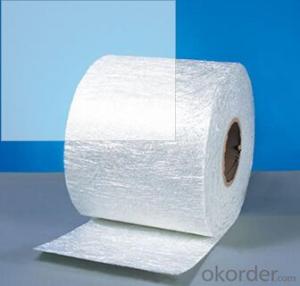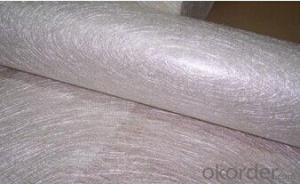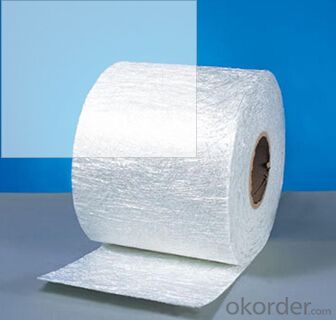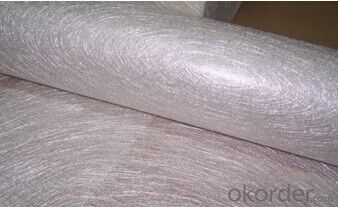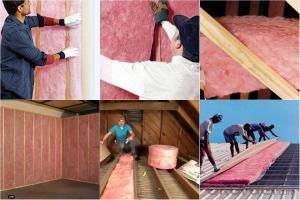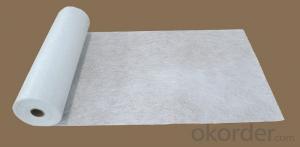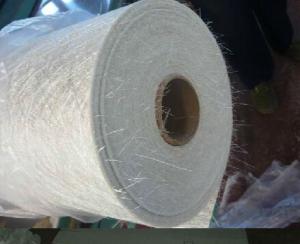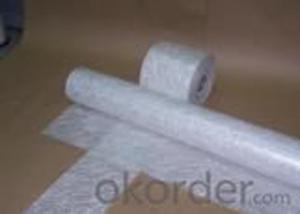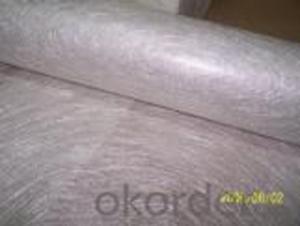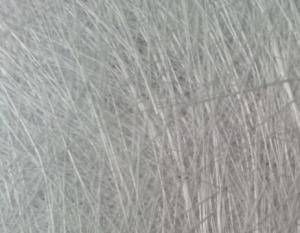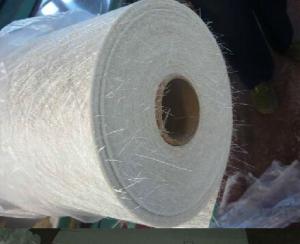Fiberglass Mat Tissue C-Glass Chopped Strand Mat-Powder 1000mm
- Loading Port:
- China Main Port
- Payment Terms:
- TT or LC
- Min Order Qty:
- -
- Supply Capability:
- -
OKorder Service Pledge
OKorder Financial Service
You Might Also Like
Structure of Chopped Strand Mat Description
Glass Fiber Powder Binder Chopped Strand Mat is an unwoven fabrics consisting of randomly distributed chopped strands held together with powder binder.Powder Chopped Strand Mats are compatible with unsaturated polyester, vinyl ester, phenol and epoxy resins.
The products are widely used in hand lay-up process and can also be used in compression molding and continuous laminating process and fixed table laminating process. The typical end-use applications include various panels, boats, bathroom accessories, automotive parts and cooling towers.
Main Features of E-glass Chopped Strand Mat
1.Strong bond fibers,providing high dimensional stability ans easy handing .
3.Good moldability,fast and complete resin wet-out ,enabling high productively .
4.Good transporsision and hign strength of the composite products.
5.Even thickness ,no fuzz ,no stain.
6.Fast wet-out ,products with high strength ,little loss for strength in damp situation.
E-Glass Chopped Strand Mat Images
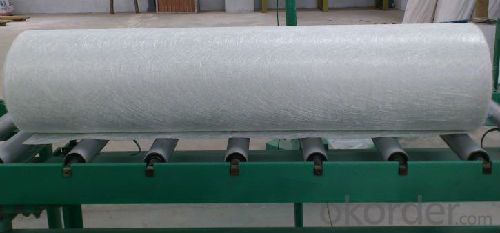
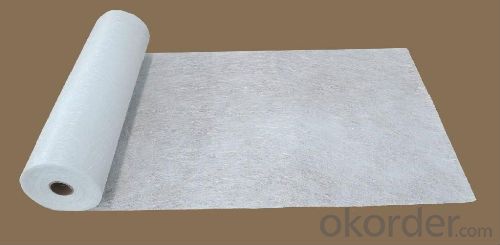
E-Glass Chopped Strand Mat Specification:
Specs | Roll length(m) | Width(mm) | Roll weight(kg) | Compatible Resin |
EMC225 | 1040mm | 144 | 30 | UP VE |
EMC300 | 1040mm | 96 | 30 | UP VE |
EMC380 | 1040mm | 80 | 30 | UP VE |
EMC450 | 2080mm | 64 | 60 | UP VE |
EMC600 | 2080mm | 48 | 60 | UP VE |
EMC900 | 2080mm | 32 | 60 | UP VE |
FAQ of Chopped strand mat
1. Why Choose us?
CNBM is a stated own company, provide the guarantee for the best quality, best service and safety business.
2. How will we guarantee the quality?
a, ISO 9001-2008 quality control system;
b, Strict and regular quality control in production;
c, Inspeciation when loading into container before shippment;
d, Sample stock for one year for quality tracing and record.
3. What is your MOQ?
Our MOQ is one pallet.
4. Can you provide sample?
Yes, samples are in stock. we can offer free sample for you.
5. Payment terms?
We can accept L/C, T/T etc.
6. Do you offer OEM service?
Yes, we can print customers’ logo on the packaging;
And the size and specification can be produced and design according to your demand.
7. What is the Production Lead Time?
1 *40HQ each day.
- Q: Can fiberglass mat tissue be used for reinforcing fiberglass roofs?
- Yes, fiberglass mat tissue can be used for reinforcing fiberglass roofs. Fiberglass mat tissue is a thin, lightweight material made of fine fibers that are bonded together with a binder. It is commonly used as a reinforcing layer in fiberglass composites, providing strength and durability. When it comes to fiberglass roofs, fiberglass mat tissue can be applied as an additional layer to enhance the structural integrity of the roof. It helps to distribute the load evenly across the surface, making the roof more resistant to cracks, leaks, and other damages. Fiberglass mat tissue is typically used in conjunction with other fiberglass products, such as resin and fiberglass cloth, to create a strong composite material. The mat tissue is placed on top of the fiberglass cloth before applying the resin. The resin then saturates the mat tissue, creating a bond between the layers. This combination creates a reinforced fiberglass roof that is stronger and more durable. Furthermore, fiberglass mat tissue can also provide thermal insulation properties to the roof, helping to regulate temperature and reduce energy consumption. It can resist heat transfer, preventing excessive heat buildup in the building during hot weather. Overall, fiberglass mat tissue is an excellent choice for reinforcing fiberglass roofs. It adds strength, durability, and thermal insulation properties to the roof, making it a reliable option for both residential and commercial buildings.
- Q: Can fiberglass mat tissue be used for insulation in oil refineries?
- No, fiberglass mat tissue is not suitable for insulation in oil refineries. Fiberglass mat tissue is primarily used in construction and automotive industries for reinforcement purposes. It is not designed to withstand the extreme temperatures and corrosive environments found in oil refineries. Instead, insulation materials used in oil refineries are typically made of fire-resistant and chemically resistant materials, such as mineral wool or calcium silicate. These materials are specifically engineered to provide optimal thermal insulation and safety in refinery operations.
- Q: Does fiberglass mat tissue provide any sound insulation?
- Indeed, sound insulation is indeed provided by fiberglass mat tissue. This widely-used material finds application in diverse industries such as construction and automotive, where its purpose is to absorb and diminish sound transmission. By means of its fibrous composition, this material efficiently seizes and absorbs sound waves, effectively preventing their penetration through walls or other surfaces. Frequently employed as acoustic insulation, fiberglass mat tissue contributes to the creation of a pleasant and serene atmosphere in walls, floors, and ceilings.
- Q: Does fiberglass mat tissue require any special surface treatments before application?
- Yes, fiberglass mat tissue does require special surface treatments before application. These treatments are necessary to ensure proper adhesion and bonding between the fiberglass mat tissue and the substrate it is being applied to. One common surface treatment is the application of a primer or bonding agent. This helps to improve the bond strength between the fiberglass mat tissue and the substrate. The primer or bonding agent is typically applied to the substrate and allowed to dry before the fiberglass mat tissue is applied. Another surface treatment is the removal of any loose or flaking material from the surface of the substrate. This can be done through mechanical methods such as sanding or grinding, or by using a chemical treatment to dissolve or remove the unwanted material. This step is important to create a clean and smooth surface for the fiberglass mat tissue to adhere to. In some cases, the surface of the substrate may need to be roughened or etched to provide a better bonding surface for the fiberglass mat tissue. This can be done using abrasives or chemical etching agents, depending on the type of substrate being used. Overall, the specific surface treatment required for fiberglass mat tissue will depend on factors such as the type of substrate, the desired bond strength, and the application method being used. It is important to follow the manufacturer's instructions and recommendations for surface preparation to ensure a successful application and long-lasting bond.
- Q: Does fiberglass mat tissue require any special precautions during disposal?
- Yes, fiberglass mat tissue requires special precautions during disposal. It should be handled with care and disposed of in accordance with local regulations. Due to its composition, fiberglass mat tissue can release harmful fibers when disturbed, which can be a health hazard if inhaled. Therefore, it is important to wear protective clothing, gloves, and a mask when handling and disposing of fiberglass mat tissue. Additionally, it should be sealed in a plastic bag or container to prevent the release of fibers into the environment.
- Q: Is fiberglass mat tissue fire resistant?
- Yes, fiberglass mat tissue is fire resistant.
- Q: Can fiberglass mat tissue be used for repairing fiberglass bathtubs?
- Yes, fiberglass mat tissue can be used for repairing fiberglass bathtubs. It is commonly used as a reinforcement material in fiberglass repairs, providing added strength and durability to the repaired area. The tissue can be easily applied and works well for repairing cracks, chips, or other damage on fiberglass bathtubs.
- Q: Can fiberglass mat tissue be used for insulation in hot climates?
- Yes, fiberglass mat tissue can be used for insulation in hot climates. It has excellent thermal insulation properties and can effectively block heat transfer, making it suitable for use in hot climates to maintain cooler indoor temperatures.
- Q: Can fiberglass mat tissue be used for ballistic protection?
- Fiberglass mat tissue can be used for ballistic protection to some extent, but it may not offer the same level of protection as other materials specifically designed for this purpose. Fiberglass mat tissue is typically used in applications such as insulation, reinforcement, and fire resistance due to its high strength and heat resistance properties. However, when it comes to ballistic protection, there are more specialized materials available that are specifically engineered to withstand the impact of bullets or other projectiles. These materials often include aramid fibers (such as Kevlar) or ultra-high-molecular-weight polyethylene fibers (such as Dyneema) which are much more effective in providing superior ballistic protection. If ballistic protection is the primary concern, it is recommended to choose materials specifically designed for this purpose rather than relying solely on fiberglass mat tissue.
- Q: Can fiberglass mat tissue be used for insulation in cleanrooms?
- Fiberglass mat tissue can indeed be used for insulation in cleanrooms. It offers several advantages that make it a suitable choice for such applications. Firstly, fiberglass mat tissue has excellent thermal insulation properties, which helps to maintain the desired temperature and prevent heat transfer in cleanrooms. This is crucial in environments where temperature control is essential for processes or equipment. Additionally, fiberglass mat tissue has good acoustic insulation capabilities, which can help in reducing noise levels within cleanrooms. This is particularly important in cleanrooms where sensitive equipment or experiments are conducted, as minimizing noise disturbances can ensure accurate and reliable results. Furthermore, fiberglass mat tissue is non-combustible, meaning it does not catch fire easily. This adds an extra layer of safety in cleanrooms where flammable materials or volatile substances may be present. The non-combustible nature of fiberglass mat tissue also contributes to its overall durability and longevity. Lastly, fiberglass mat tissue is resistant to moisture, making it suitable for cleanrooms where humidity control is crucial. It does not absorb moisture, preventing the growth of mold or mildew, which can be detrimental to cleanroom environments. Overall, fiberglass mat tissue is a viable option for insulation in cleanrooms due to its thermal and acoustic insulation properties, non-combustible nature, and resistance to moisture. Its use can contribute to maintaining the desired conditions within cleanrooms and ensuring the integrity of processes and equipment.
Send your message to us
Fiberglass Mat Tissue C-Glass Chopped Strand Mat-Powder 1000mm
- Loading Port:
- China Main Port
- Payment Terms:
- TT or LC
- Min Order Qty:
- -
- Supply Capability:
- -
OKorder Service Pledge
OKorder Financial Service
Similar products
Hot products
Hot Searches
Related keywords
